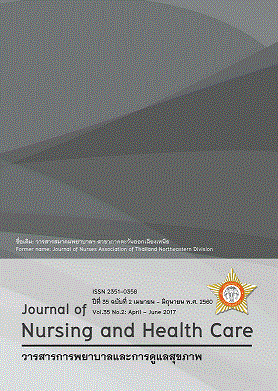ผลของโปรแกรมการสนับสนุนทางสังคมต่อภาวะสุขภาพจิตของผู้สูงอายุ The Effect of a Social Support Program on the Mental Health of The Elderly
คำสำคัญ:
การสนับสนุนทางสังคม, สุขภาพจิต, ผู้สูงอายุ social support, mental health, elderlyบทคัดย่อ
บทคัดย่อ
การวิจัยกึ่งทดลองนี้มีวัตถุประสงค์เพื่อศึกษาผลของโปรแกรมการสนับสนุนทางสังคมต่อภาวะสุขภาพจิตของผู้สูงอายุ กลุ่มตัวอย่างเป็นผู้สูงอายุที่อาศัยอยู่ในชุมชน คัดกรองโดยใช้แบบคัดกรองสภาพสมองเบื้องต้น (MMSE-T) จับคู่กันแล้วสุ่มอย่างง่าย แบ่งเข้ากลุ่มทดลองและกลุ่มควบคุม กลุ่มละ 30 คน กลุ่มทดลองได้รับโปรแกรมการสนับสนุนทางสังคม ระยะเวลา 8 สัปดาห์ กลุ่มควบคุมได้รับการดูแลตามปกติ เก็บรวบรวมข้อมูลโดยใช้แบบประเมินสุขภาพจิตผู้สูงอายุฉบับสมบูรณ์ (T-GMHA-56) วิเคราะห์ข้อมูลทั่วไปโดยใช้สถิติเชิงพรรณนา เปรียบเทียบการเปลี่ยนแปลงของคะแนนเฉลี่ยสุขภาพจิตผู้สูงอายุ ก่อนและหลังการทดลองด้วยสถิติทดสอบค่าที (t-test)
ผลการศึกษาพบว่าภายหลังการให้โปรแกรมการสนับสนุนทางสังคม กลุ่มทดลองมีคะแนนเฉลี่ยสุขภาพจิตหลังทดลอง (M=186.7, SD=13.1) สูงกว่าก่อนทดลอง (M=167.4, SD=14.1) และผลต่างของค่าเฉลี่ยคะแนนสุขภาพจิตก่อนและหลังทดลอง ของผู้สูงอายุกลุ่มทดลอง (=19.3, SD=13.8) สูงกว่ากลุ่มควบคุม (=1.8, SD=14.9) ที่ได้รับการดูแลตามปกติ ผลการวิจัยนี้สามารถนำไปใช้เป็นทางเลือกหนึ่งในการออกแบบกิจกรรมหรือโปรแกรมเพื่อการดูแลส่งเสริมสุขภาพจิตสำหรับผู้สูงอายุ
Abstract
This quasi experimental research aimed to examine the effects of a social support program on mental health of the elderly. The study sample included 60 elderly who live in a community setting and were screened for mental health status using the Thai Mini-Mental State Examination (MMSE-T). The participants were matched pair and simple randomly allocated into the experimental and control groups (n=30 per group). The experimental group received the social support program for 8 weeks. The control group received routine care only. The data was collected using the Thai Geriatric Mental Health Assessment (T-GMHA-56). Demographic and general data were analyzed with descriptive statistics. T-test was used to compare mental health mean scores between pre and post-test.
Results showed that after receiving the social support program, the elderly in the experimental group had higher post-test mental health mean scores (M=186.7, SD=13.1) than the pre-test mean scores (M=167.4, SD=14.1). Furthermore, the mean difference between pre-test and post-test mental health scores of the elderly in the experimental group (=19.3, SD=13.8) was higher than the mean difference of the control group receiving routine care (=1.8, SD=14.9). Thus, the result of this study could be used as an alternative for designing an intervention program aiming at promoting mental health for the elderly.


